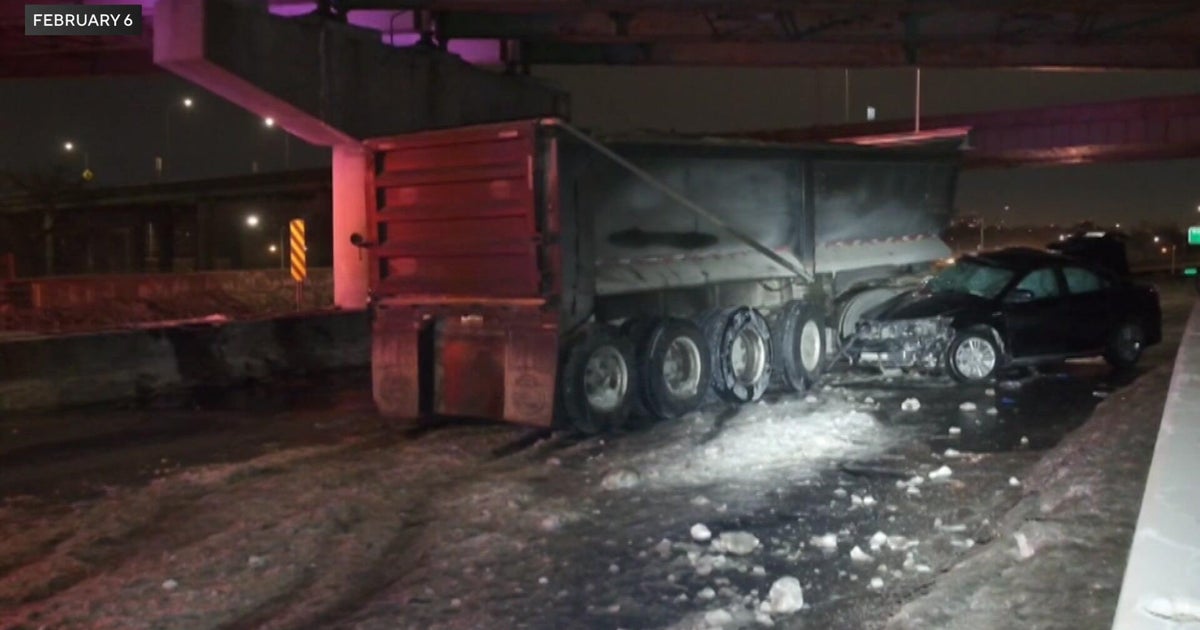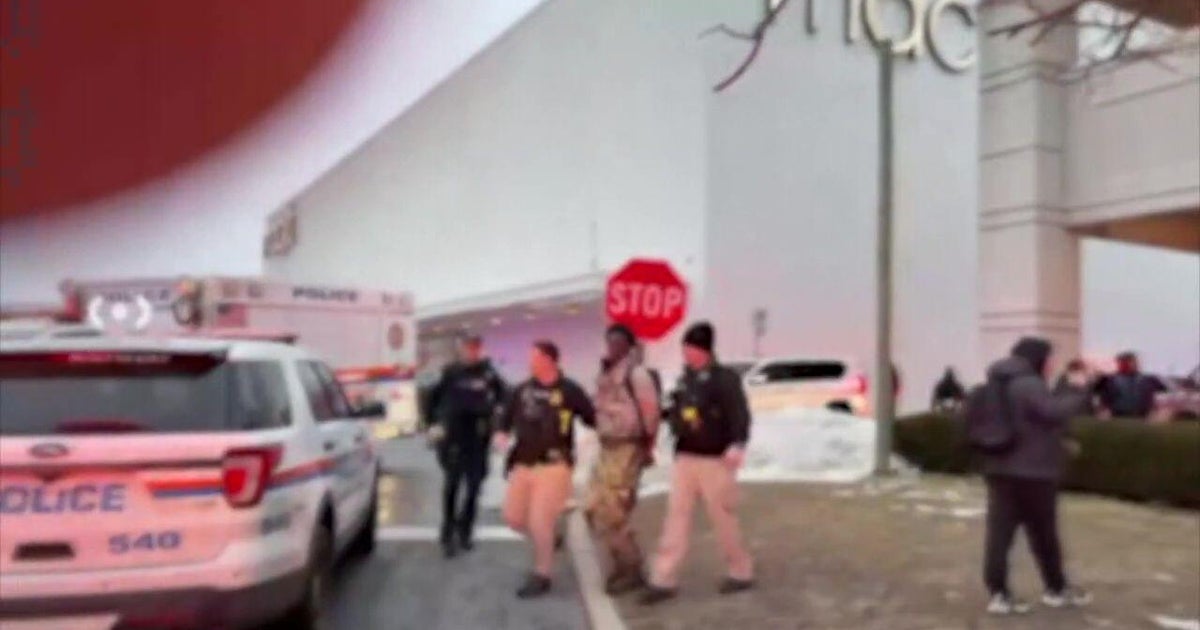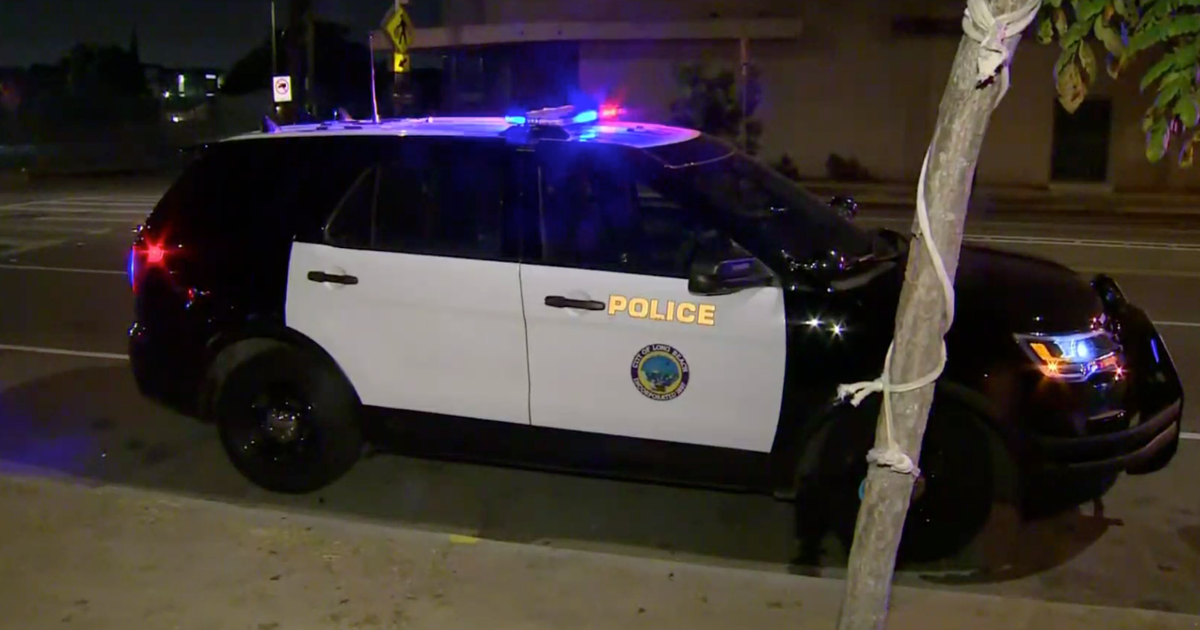Driver Charged In Nassau County Cop's Death Faces Case That Tests Limits Of Criminal Blame
MINEOLA, N.Y. (CBSNewYork/AP) -- A man driving home from New York City after a night of drinking set off a sequence of crashes that resulted in a police officer's death and should be held criminally responsible for it, prosecutors said Tuesday at his trial.
Nassau County Police Officer Joseph Olivieri was killed by another man's SUV while maneuvering through wreckage on the Long Island Expressway.
Although the defendant, James Ryan, wasn't actually the driver who struck the officer in October 2012, he created the situation that led to the accident, Nassau County Assistant District Attorney Michael Bushwack told jurors in his opening statement.
Prosecutors said Ryan caused Oliveri's death "not intentionally, but recklessly," CBS2's Carolyn Gusoff reported.
"He forged a link in the chain of causes that killed Officer Olivieri,'' Bushwack said. "Officer Olivieri died protecting the person whose recklessness killed him.''
Defense attorney Zeena Abdi argued, however, that the SUV driver who actually struck the police officer -- and who was never charged -- is the one responsible.
"This case is a stretch,'' Abdi said. "It is a tragic case, but it is a stretch. The fact that he was drinking does not mean he caused Officer Olivieri's death.''
"I think the district attorney's office has been blinded by the allegations of alcohol use,'' defense attorney Marc Gann previously said. "There's nobody else to criminally blame so they blame Ryan. --- It's extremely unusual for a person not driving to be charged with a vehicular death.''
Ryan's trial on aggravated vehicular homicide, manslaughter, drunken driving and other charges began Tuesday following years of vigorous court battles.
Ryan, a 28-year-old part-time student, has pleaded not guilty to aggravated vehicular homicide, manslaughter, driving while intoxicated and other charges. He could face 8-25 years in prison if convicted.
Legal experts are closely watching the case, which tests the limits of criminal consequences because Ryan wasn't behind the wheel when the police officer was struck and killed -- he was leaning against the guardrail.
"This factual situation is certainly rare and relatively unique,'' said Joseph McCormack, an adjunct law professor at St. John's University who serves as the New York state traffic safety resource prosecutor.
McCormack said prosecutors are employing the legal principle of "causation/foreseeability,'' in which suspects are charged in events that are foreseeable results of their actions. In one such case from 1994, a New York City man was convicted of murder in the death of an officer who was chasing after him in a robbery investigation and fatally fell through a skylight.
More recently, in 2013, Nassau prosecutors convicted a man of vehicular manslaughter for the death of a motorcyclist who crashed into his wrecked car after he crashed while driving intoxicated.
According to prosecutors, Ryan's Toyota first clipped a BMW on the expressway, stopped farther down the road in the high-occupancy lane and then was hit by another car. A few minutes later, an SUV driver apparently did not see Ryan's vehicle, which had been turned sideways from the earlier crashes, and smashed into Ryan's car before hitting Olivieri.
The driver who hit the officer was not charged and has been given immunity from prosecution for his testimony, WCBS 880's Mike Xirinachs reports.
Prosecutors say Ryan had been drinking in a Manhattan bar and at the time of the accidents had a blood-alcohol level of 0.13, above the state's 0.08 threshold of drunkenness.
Bushwack said Ryan's actions "caused chaos on the expressway that night.''
Nassau County PBA President James Carver said the events that led to Olivieri's death were created by the defendant.
"If the defendant in this case hadn't been -- first of all -- drinking and driving that's number one, been involved in the first accident, left that scene and then created another accident scene, Police Officer Olivieri wouldn't have been put in a position where a third passerby would've struck and killed him," Carver told 1010 WINS.
A state judge initially dismissed the charges, finding Olivieri's death was "solely attributable'' to the SUV driver, who was never charged.
A state appeals court later reinstated the charges, saying it was "reasonably foreseeable that the defendant's conduct would cause collisions and that the police would respond and be required to be in the roadway, where they would be exposed to the potentially lethal danger presented by fast-moving traffic.''
It also noted Ryan's actions "need not be the sole cause of death and, indeed, the defendant need not have committed the fatal act to be liable.''
Leonard R. Stamm, a Maryland attorney and dean of the National College for DUI Defense, did not agree with that ruling.
"It appears that the appellate court took a much broader view,'' Stamm said in an email. "It is not reasonably foreseeable that driving drunk would cause that kind of fatal accident.''
Olivieri was a 19-year police veteran — five years with the NYPD and 14 with Nassau County.
Carver said the PBA will make its presence known at trial.
"Do not forget Police Officer Joseph Olivieri, he was out there doing his job on Oct. 18, 2012, just like any other police officer is doing it every single day and his life was lost that day doing one of the most routine assignments that a police officer can respond on," Carver said. "This is a start of a trial that gives closure to the family."
(TM and © Copyright 2016 CBS Radio Inc. and its relevant subsidiaries. CBS RADIO and EYE Logo TM and Copyright 2016 CBS Broadcasting Inc. Used under license. All Rights Reserved. This material may not be published, broadcast, rewritten, or redistributed. The Associated Press contributed to this report.)







